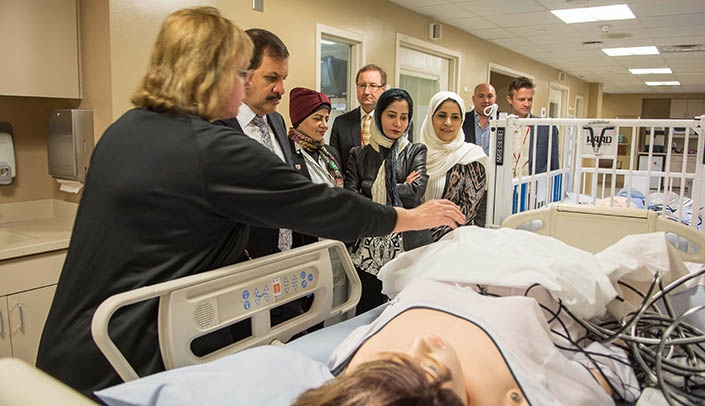A delegation of the Qatar National Committee for the Prohibition of Weapons visited with UNMC's leadership this past week to explore a collaborative relationship to help establish Qatar as a global leader in biosecurity and improve local preparedness efforts for the World Cup in 2022 and beyond. They learned about the public health laboratory, first responder, emergency management and health care security. UNMC and the Qatar delegation discussed models for simulation and training programs currently delivered through UNMC's College of Public Health and Global Center for Training and Education, co-hosts of the visit. Visitors included:
- Major General Nasser Al-Ali, chairman of the National Committee for the Prohibition of Weapons (NCPW);
- Jameela Al-Ajmi, M.D., senior consultant for infectious diseases, member of NCPW;
- Nouf Al-Thani, expert assistant from the Ministry of Defense and member of the Qatar royal family; and
- Moza Al Ishaq, Ph.D., executive director of the Clinical Transformation Corporate Quality Patient Safety Program.
They toured the biocontainment unit, iEXCEL℠ Technology Lab, Fred & Pamela Buffett Cancer Center, the innovation hub and Joslyn Art Museum. Today, they are in Washington, D.C., to meet with University of Nebraska President Hank Bounds and representatives of the U.S. Department of Defense, National Strategic Research Institute, the Centers for Disease Control and Prevention, and the Walter Reed Army Institute of Research. Qatar is a small sovereign country that occupies the Qatar Peninsula on the eastern coast of the Arabian Peninsula. Its sole land border is with Saudi Arabia to the south, with the rest of its territory surrounded by the Persian Gulf. With a population of 2.6 million, Qatar has the highest per capita income in the world that is backed by the world's third-largest natural-gas and oil reserves. The 2022 World Cup will be the first ever to be held in the Middle East and in an Arab and a majority-Muslim country. "The government of Qatar wants to serve as a regional and global resource for health security and showcase these efforts in preparation for the millions of expected visitors who will attend the World Cup," said Ali S. Khan, M.D., M.P.H., dean of the College of Public Health, and host to the group.
